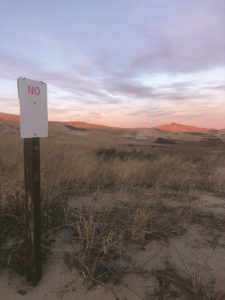PROVINCETOWN — A federal judge ruled on Jan. 22 that the collection of fees by the National Park Service (NPS) for commercial filming is a violation of free speech. This ruling could have implications for the Cape Cod National Seashore (CCNS), as 20th Century Studios has sought film location permits in both the town of Provincetown and the Seashore for a project widely reported to be season 10 of Ryan Murphy’s American Horror Story television series.
E&E News reported that U.S. District Judge Colleen Kollar-Kotelly sided with an independent filmmaker who was cited by the NPS in 2017 for filming in a national park without a permit. The broad scope of the NPS permitting regime “imposes a chilling effect on the expressive activities of a wide swath of national park visitors,” the ruling stated.
Seashore Supt. Brian Carlstrom confirmed that 20th Century Studios, which was acquired by the Walt Disney Company as part of a $71.3-billion deal in 2019, had for many months sought a permit to film in the Seashore. When asked if the company had secured a permit, Carlstrom’s one-word response was “No.”

Because the court decision affects the NPS, the U.S. Fish and Wildlife Service, the Bureau of Land Management, and several other Interior Dept. agencies, said Carlstrom, he declined to answer any questions about the court ruling or its effects, and asked that all inquiries go to the NPS office in Washington, D.C. As of Tuesday, the NPS had not responded to requests for comment.
The Seashore’s website has, however, been updated and now states: “As regulations regarding commercial filming permits are being reassessed, those interested in commercial filming activities on land managed by the National Park Service are encouraged to contact the park directly for more information about filming in the park and to discuss how to minimize potential impacts to visitors and sensitive park resources…. Currently, the National Park Service is not issuing commercial filming permits, but is in the process of evaluating how best to regulate filming activities that affect visitors and park resources…. The National Park Service is no longer collecting application or location fees, or cost recovery for filming.”
Commercial filming location fees previously amounted to as much as $750 per day. In 2019, the NPS collected $390,300 in such fees.
According to an application submitted by a 20th Century Studios television producer, Julie Herrin, to the town of Provincetown, a production titled “Pilgrim” planned to film in locations throughout Provincetown and the National Seashore between Jan. 25 and March 13. The application stated that there would be 130 people in the production crew.
On Jan. 11, the Provincetown Select Board approved in concept a location agreement between the town and 20th Century Studios for filming between Feb. 1 and March 6. The filming dates have been pushed back, however, as negotiations with the town continue.
Two of the locations listed in the application were within the National Seashore. “Location 14” is listed as “Race Point Rd. between Route 6 and Race Point Beach Parking Lot” and would include three days, including one “prep” day, one filming day, and one “wrap” day. The exact dates are still to be determined.
“Location 19” is listed as Race Point Beach, with filming dates and times to be determined. A scene or scenes in one undisclosed location “may involve a shotgun with blanks acting as if hunting birds,” according to the application.
It is unclear how Judge Kollar-Kotelly’s ruling will affect 20th Century Studios’s plans to film in the National Seashore. The Independent asked two location managers for the production, Matthew Prisk and Tiffany Kinder, for comment, but has not received a response.
NPS officials were provided an opportunity by the court to revise the fee system in a way that would pass judicial review.
“In issuing this injunction,” wrote Judge Kollar-Kotelly, “the Court observes that a more targeted permitting regime for commercial filming, which is more closely connected to the threat posed by large groups and heavy filming equipment, may pass constitutional muster in the future.”
Her ruling states, “The National Park Service has also shown itself capable of enacting regulations that preserve park resources without overly burdening expressive activity, and may continue to do so in ways that do not run afoul of the First Amendment.”



